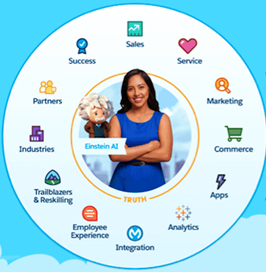
When Salesforce initially launched, it was primarily a tool for sales teams. Since then, it’s evolved to be much more than that. Not only has Salesforce expanded their own product offerings to appeal to a wider audience, but thousands of vendors now offer apps on the Salesforce AppExchange that appeal to teams across every business, including Finance and Accounting departments.
Using Salesforce for accounting workflows can reduce friction and break down barriers between internal teams. Sales teams want to sell to as many customers as possible, and they want a seamless customer experience. If the finance and accounting departments have a single source of truth for customer, product, and revenue data, the sales and billing process can go off without a hitch.
With the right approach and features in place, the transition of data from the sales team to the finance and accounting teams can be friction-free, leaving you wondering, “why didn’t we do this sooner?”
What’s In It For Me?
You’re probably reading this thinking, “Salesforce sounds great, but what’s really in it for me?” It’s no secret that Salesforce’s mission is to transform the customer journey, starting from life as a lead, all the way through to the realization of revenue. This is sometimes called the ”Lead to Cash” process, and the most important part for finance and accounting teams is the “cash” part.

Historically, finance and accounting departments have been forced to do excessive amounts of manual data collection and entry, as they tend to use legacy systems that have not been connected with other tools used across the organization. This leads to inefficiencies that ultimately generate revenue leak. Revenue leak is the loss of revenue from your company that is preventable.
By using an accounting system native to Salesforce, finance and accounting teams can:
- Reduce manual data collection and entry
- Have access to real-time dashboards and reports
- Create a better customer experience
5 Benefits Of Using Salesforce
There are several powerful benefits when finance and accounting as well as Sales teams use Salesforce, including automation, business-wide visibility, and an overall improved customer experience. Let’s take a look at the key Salesforce benefits.
Automated Data Collection
One huge benefit of using Salesforce technology and native applications in the finance department, is automating data collection. Data no longer needs to be manually entered into the accounting tool—it’s all in one system! You have complete visibility of the sales process, and can set up processes for sales to collect critical pieces of information during the sales process. For example, you can create tax identification numbers before an opportunity closes. This saves time on the backend and reduces errors that can come from manual data entry.
Visibility Across The Business
By having dashboards on Salesforce for accounting and finance, teams are always looking at live data and have complete visibility across the entire organization.

No longer are you restricted to reporting on just what’s in the finance system of record. You can get visibility into other areas of the business and cross-reference it with your accounting data to get a better idea of the business as a whole.
Automate Tasks
Accounting teams in every company always seem to be overloaded with work, whether it’s sending invoices out manually to customers, paying vendors, chasing customers for payment, or working to reduce bad debt. Using Salesforce in the accounting department can help reduce the burden on accounting teams by allowing you to set up workflows to automate some of these tasks.
Invoicing can be automatically generated and sent to customers, as can email reminders to customers who haven’t paid their invoices on time. Accounting software native to Salesforce can be configured to automate these repetitive tasks very easily. Your team can focus on tasks that require human input and leave the system to do the rest!
Read on to learn more about the Benefits of Automated Accounting Software with Salesforce.
Improved Customer Experience
It’s no surprise that if your organization is easy to do business with, customers will be happier and will continue to buy your products for a long time. When teams don’t work from the same data set, it can cause errors, miscommunications and overall, a poor customer experience, resulting in fewer purchases and less revenue.
How does it feel when you contact a business and you end up being passed around from department to department because no one seems to be able to help you? It’s frustrating to say the least, but it can also make you lose faith that the organization is worth doing business with and means you’re unlikely to work with them again.
Having finance, accounting, and sales teams all use one system removes the silos that inevitably form when working in different systems. Using Salesforce for accounting in this way helps all teams involved in the sales process to collaborate better.
Secure And Accessible Data
Customer data is some of the most sensitive data your organization stores and it needs to be secure, accessible, and backed up.
By using a tool like Salesforce in the finance department, you’re working with one of the most secure online platforms in the world today. Salesforce has a vast library of certifications and has data centers throughout the world.

Salesforce operates with an uptime of 99.9% so it’s extremely rare for Salesforce’s servers to ever be down. That’s hugely helpful, since server downtime often results in lost revenue and a poor customer experience.
Salesforce data is also accessible from any device with an internet connection, so your teams can operate from anywhere, with greater flexibility. This is extremely important in today’s hybrid working environment.
Lastly, you can back up and restore Salesforce data very easily with the right tools. Salesforce offers their own backup services, and there are numerous vendors on the AppExchange who offer their own backup setups.
When all of your data is on a single platform, you reduce the risk of data breaches, data loss and data inaccessibility.
Best Uses Of Salesforce
We’ve highlighted some of the benefits of using Salesforce for finance and accounting teams, and now we’ll explore some specific use cases and how Salesforce can help.
Collect And Recognize Revenue Faster
The role of finance and accounting departments in an organization is critical to the longevity of the business. It’s simple really—a business cannot operate without cash flow, and automating as much of the revenue collection and recognition process as possible will improve your bottom line.
Salesforce for accounting allows finance and accounting teams to automate critical workflows that result in faster collection of payments.
Report In Real-Time
Reporting data in real time can surface important information that may otherwise go undetected, resulting in possible revenue leak for your organization. Create custom reports to track unpaid invoices, project expenses, available inventory and more, all using live Salesforce data.

You can monitor the sales team’s discounting practices and enforce approvals for excessive discounts. You can also cross-reference customer data, such as those who have unpaid debts, with late-stage opportunities and get ahead of potential problems before they start.
Companies that operate a subscription model have even more complex reporting needs, because they need to forecast bookings (a closed opportunity for a specified term) versus billings (actual amount the customer is paying, typically annually). Having real-time reports to distinguish bookings from billings is critical to understanding the cash flow of an organization.
Learn more about the best reports and dashboards available on Salesforce:
- Salesforce Joined Reports: What are They and What to Know
- What is a Salesforce Dynamic Dashboard? Everything to Know
- Best Salesforce Financial Dashboards & Reports for Your Business
Take Payments Automatically
Salesforce native accounting software like Accounting Seed can streamline payment processes. Imagine sending an invoice to your customer and including a link to a payment provider where the customer could pay their invoice directly. Once they’ve paid, the payment provider sends a message back to Salesforce updating their invoice as “paid.”
This means no one on the accounting team has to go through bank statements to reconcile payments made by customers—the system is already up to date! Even if this kind of automation could only be used by a handful of customers, it would significantly reduce the amount of manual reconciliation required.
Reduce Bad Debt
In B2B sales, customers are often given a period of time in which they must pay their invoice. By that time, they may already have the goods or services they have yet to pay for. If a customer does not pay, this becomes bad debt for a company.
If your finance department uses Salesforce technology and native applications for accounting, you can update a customer’s Account record with a restriction so that if they have unpaid debts, the sales department cannot sell to that customer until the customer pays off their existing debt.
There are even tools you can integrate with Salesforce to run a full credit check and update the customer’s credit status regularly, to prevent sales teams from selling to customers with a poor credit rating. This improves cash flow and reduces company debt, both of which are critical to an organization’s success.
Here’s some more B2B Commerce on Salesforce Tips.
Accounting & Finance Workflows on Salesforce
Accounting Seed is a Salesforce native accounting software that helps organizations streamline their accounting workflows and provides out of the box reports and dashboards to help organizations make better decisions with live, real-time reporting. To see how your finance and accounting teams could benefit from working with Salesforce native accounting software , book a demo with the Accounting Seed team today!
Read on:
- Best Vendor Payment Processes for Businesses
- Salesforce for E-Commerce: Everything to Know About This B2C Platform
- Salesforce Order Management: Everything to Know
- Is Salesforce a Good CRM for Nonprofits?
- Is Salesforce a Good CRM for Manufacturers?
- How to Make Business Financial Statements
- Top 7 Issues Accountants Face Today
- DCAA Compliant Accounting Software: What to Look For
- What are the International Accounting Standards (IAS)?
- Top 8 Reasons Why IT Implementations Fail
- Accounting Cybersecurity: How to Keep Financial Data Safe and Secure
- What is Cash Disbursement in Accounting?
- Do I Need Accounting Software for My Small Business?
- Startup Accounting Guide: Everything You Need to Know
- Accrued Expenses: What are They And How to Report Them?
- Intro to Accounts Payable and Purchase Order Accounting
About Accounting Seed
With over 50,000 users globally, Accounting Seed utilizes the Force.com Platform to seamlessly connect data from sales lead to accounting ledger—providing a complete view of business performance in one system without costly integrations. Want expert advice on the benefits of accounting natively on Salesforce? Let’s talk.
See Accounting Seed in action
Get a close-up view of how accounting on Salesforce can eliminate the need for costly integrations—and silos of mismatched information—by sharing the same database as your CRM.


